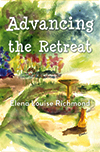A Post-Election Day Charm
My Ukrainian wheat charm is about to fall off my car’s rear view mirror. On the day after the 2010 elections, even its precarious dangle is welcome. This charm has power to make stuck joints glide, to soothe pain and to turn a pessimist inside out. Here is how it came into my possession:
I did a watercolor workshop at the Sitka Center for Art and Ecology at Cascade Head just north of Lincoln City a while back. It was three lovely days of quiet concentration in peaceful surroundings with interesting subjects to paint and an inspiring teacher, Molly Hashimoto. Every day after seven hours of peace and art, I went to a clean, but unimaginative hotel in Lincoln City and dwelt amongst the dogs, sand, salt water taffy, kites, screaming children and yelling parents. The contrast was just right.
But the weekend did not begin with such a balance. My back was bothering me the day I left Seattle. After driving for 6 hours, my pelvis managed to become rotated forward on the right side, and backward on the left. Then it locked itself into place. This is not unlike the current situation in Congress. Or maybe I should say that with some variation, this is always the situation in Congress. In any case, both with Congress and my pelvis, the pain is relentless.
My first morning in Lincoln City, I cried in frustration for 45 minutes before I decided that I couldn’t gut this out. I had to find a chiropractor. In the phone book I found a doctor a block from my hotel. I recognized the name from reconnoitering the town the day before. I hobbled up the street to see if his hours were posted. The ideal was for him to see me immediately. And that was essentially what happened.
But I anticipate myself. His office front looked as though he had gone out of business 20 years ago and had neglected to take down the sign. The office was dark when I got there. Since the door was unlocked, I walked in. A seedy, scruffy guy stood in the gloom, looking startled. My first thought was that the doctor let the construction workers from across the street come in to use the toilet. But no, he was the doctor. He had just arrived and hadn’t turned on the lights yet. He needed 45 minutes to get organized. I agreed to come back at 9:15.
After I left, I started to panic. I come from a long line of robust paranoids and my upbringing kicks in with full force at times, especially when I am traveling alone. I re-visited my first impression that the man in the office was a construction worker come to use the toilet. Or a smooth-talking thief. His appearance certainly didn’t inspire any more confidence than the faded, beat-up office front did. Conceivably, even a decent chiropractor who didn’t know my body could make things worse, as hard as that was to imagine. But I was in pain and desperate so I decided to chance it.
He was professional, thorough, and gentle. He did an exam, an ultra-sound, traction, and the adjustment; and only charged me $60. When I stood up, I was out of the sirening, stabbing pain. There were only varying degrees of inflammation and tenderness through-out the weekend, depending on how careful I was about what I threw myself into.
As I was driving out of town at the end of the workshop, I stopped by his office and gave him one of my watercolors as a thank you. We got to chatting and it turned out that he was born near my grandparents’ birthplace in the Ukraine. His mother made Ukrainian wheat charms, for sale at $10 a piece in the office. I bought one to commemorate my good fortune in finding her son.
The charm has hung off my car’s rear view mirror for years, a reminder of life’s surprises. It’s easy to get stuck thinking change has to happen in certain ways. If you are waiting for Congress–speaking of smooth-talking thieves– to make the changes you want, you need a charm like mine.
 RSS Feed
RSS Feed
